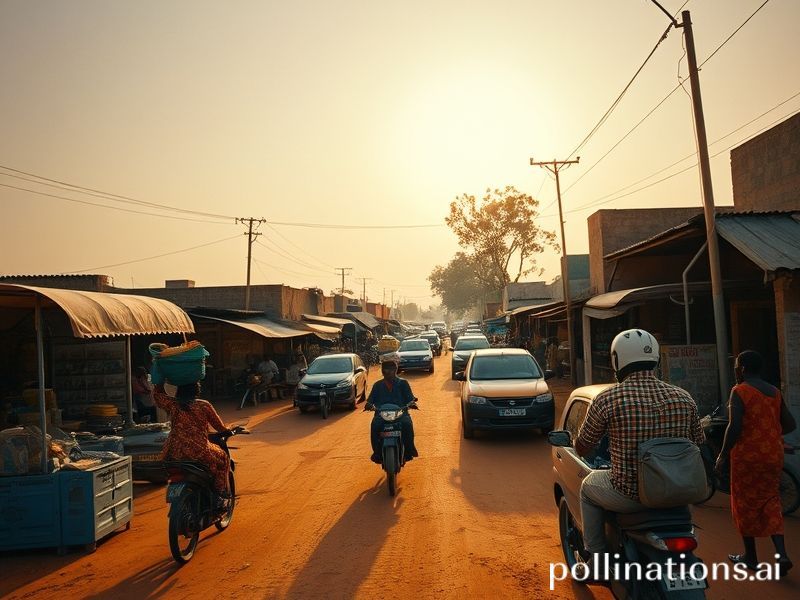Bamako: The Sahel’s Reluctant Epicenter Where World Powers Play Musical Chairs While the City Just Tries to Charge Its Phone
Bamako, the capital whose name sounds like a late-night jazz riff but whose mornings smell of diesel, dust, and unfiltered ambition, sits on the Niger River like a card player who’s already shown his hand too many times. In the global imagination, Mali is either a red blob on the Foreign Office map or the backdrop for a Bono cameo, yet Bamako keeps stubbornly existing—trading, arguing, charging its phones off Chinese solar panels while the rest of the world refreshes its feed.
Zoom out and the city becomes a handy synecdoche for the Sahel’s slow-motion identity crisis. To Washington, it’s a line item in a drone budget. To Moscow, it’s the newest patch on the Wagner souvenir quilt. To Paris, it’s the ex who still has the house keys and won’t return the calls. Meanwhile, Bamako’s residents queue for baguettes that cost more every week because the CFA franc is taking a leisurely stroll off a cliff, cheerfully escorted by global inflation and the local junta’s talent for economic haiku.
The geopolitical buffet is crowded. Turkish Bayraktar drones buzz overhead like metallic mosquitoes, Russian flags wave from motorbikes next to French-language billboards advertising Algerian yogurt, and U.S.-funded NGOs hand out gender-sensitive sacks of rice while Chinese engineers resurface the airport runway they originally built in 1975. If you squint, it looks like a G-20 summit got lost on the way to Davos and decided to set up camp in a traffic jam.
Yet the river still does what rivers do: carry fish, plastic bottles, and gossip. Fishermen complain the catch is smaller since the gold miners upstream switched from pans to mercury, a detail the World Bank report politely calls “sub-optimal resource governance.” Onshore, Bamako’s youth crowd cyber-cafés to argue whether the latest coup counts as season three or a reboot, pausing only to Venmo (or whatever the Malian equivalent is) for the next Chelsea match. Spotify streams Afrobeats over cracked phone screens, each beat a tiny act of cultural treason against the jihadists who’ve banned music in the territories they control—territories that, on a bad day, start just 60 kilometers north of the city limits.
Climate change has joined the party uninvited. The rainy season now behaves like a moody influencer: all tears or none. When it floods, Bamako’s unpaved avenues become canals of entrepreneurial possibility; boys charge 500 francs to carry office workers across on their backs, a human Uber with better conversation. When the rains don’t come, the Niger shrinks and the city’s generators cough harder, reminding everyone that electricity is still a foreign policy decision.
For the wider planet, Bamako is a stress test with live ammo. If a city this wired, this historically cosmopolitan, can still flirt with state collapse, then the entire Sahel is a domino line wearing faulty helmets. Europe worries about the next boat of migrants; Gulf states eye the uranium; crypto bros salivate over the telecom market. Everyone wants a slice, but nobody wants to pay the tab for the public hospital where the ceiling fans spin at the speed of regret.
Still, people marry, divorce, invent new sauces for rice, and debate whether the president’s new motorcade is armored enough to survive Instagram ridicule—proof that the banal persistence of daily life remains the most subversive force on earth. Bamako keeps teaching the same lesson the world refuses to learn: history is what happens while the superpowers are busy updating their strategies.
So next time you see Mali trending, remember it’s not a tragedy or a thriller; it’s a long-running tragicomedy with unreliable narrators and an ever-shifting cast. The curtain never falls in Bamako—it just changes scenes, usually during a power cut, lit by the glow of a thousand phone screens searching for a signal that stubbornly refuses to die.







